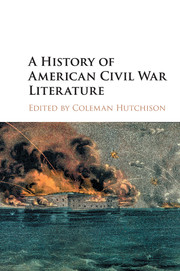Book contents
- Frontmatter
- Dedication
- Contents
- List of Illustrations
- Notes on Contributors
- Preface
- Acknowledgments
- Part I Contexts
- Part II Genres
- Part III Figures
- 12 Walt Whitman
- 13 War and the Art of Writing: Emily Dickinson's Relational Aesthetics
- 14 Herman Melville and the Civilian Author
- 15 Looking at Lincoln
- 16 Frederick Douglass, Violence, and Abraham Lincoln
- 17 Mary Boykin Chesnut: Epic and Miniature
- 18 Mark Twain
- 19 Replay: William Faulkner and the Civil War
- 20 Robert Penn Warren's Civil War
- 21 Natasha Trethewey's Civil War
- 22 Afterword: Archiving the War
- Recommendations for Further Reading
- Index
21 - Natasha Trethewey's Civil War
from Part III - Figures
Published online by Cambridge University Press: 05 December 2015
- Frontmatter
- Dedication
- Contents
- List of Illustrations
- Notes on Contributors
- Preface
- Acknowledgments
- Part I Contexts
- Part II Genres
- Part III Figures
- 12 Walt Whitman
- 13 War and the Art of Writing: Emily Dickinson's Relational Aesthetics
- 14 Herman Melville and the Civilian Author
- 15 Looking at Lincoln
- 16 Frederick Douglass, Violence, and Abraham Lincoln
- 17 Mary Boykin Chesnut: Epic and Miniature
- 18 Mark Twain
- 19 Replay: William Faulkner and the Civil War
- 20 Robert Penn Warren's Civil War
- 21 Natasha Trethewey's Civil War
- 22 Afterword: Archiving the War
- Recommendations for Further Reading
- Index
Summary
I had quoted the graveyard ode by Allen Tate.
In that old hall, it had made a passing sense.
But Natasha's clear soprano said ‘It was not my war.’
James Applewhite, “The Literary Conference in Chattanooga”The lines from James Applewhite's poem that serve as my epigraph recollect an exchange with Natasha Trethewey during a conference session about southern poetic responses to the Civil War. Trethewey's claim, “It was not my war,” disavows not the war and its surrounding histories per se but more precisely Fugitive Allen Tate's mournful angst over the Confederacy's failure in “Ode to the Confederate Dead” (1928). Tate's elegiac poem reflects a modernist reboot of the Cult of the Lost Cause. Tate was a white, male writer who grew up in privilege at the turn of the twentieth century. Trethewey, by contrast, is a female writer of mixed race who was the child of a marriage between a white father (poet Eric Trethewey) and a black mother (social worker Gwendolyn Ann Turnbough). According to Mississippi legal statutes in 1965, miscegenation, a term first coined during the Civil War, was illegal; therefore Trethewey, the product of this taboo marriage, was born into “psychological exile” as a mixed race child. Consequently, Trethewey has no truck with Tate's Eliotic worrying of the wound left by the Confederate States of America's (CSA) defeat and dissolution. Instead, Trethewey's purported response rhymes with sociologist Larry J. Griffin's observation that the Civil War was in fact a victory for millions of southerners – namely, those African Americans newly emancipated from enslavement. To make the war hers, Trethewey rewrites the dominant historiographic record to reveal heretofore underwritten episodes, especially the accomplishments of more than 200,000 African American soldiers who served during the war. Trethewey's impulse is toward countermemory: to trace residual, resistant strains of these alternate histories, to build out of her poetry a collective cenotaph to the Black Union dead.
Currently Robert W. Woodruff Professor of English and Creative Writing at Emory University, Trethewey (born 1966; active 2000–present) is a native of Gulfport, Mississippi, and has become one of the most visible and highly honored contemporary American poets.
- Type
- Chapter
- Information
- A History of American Civil War Literature , pp. 316 - 330Publisher: Cambridge University PressPrint publication year: 2015



